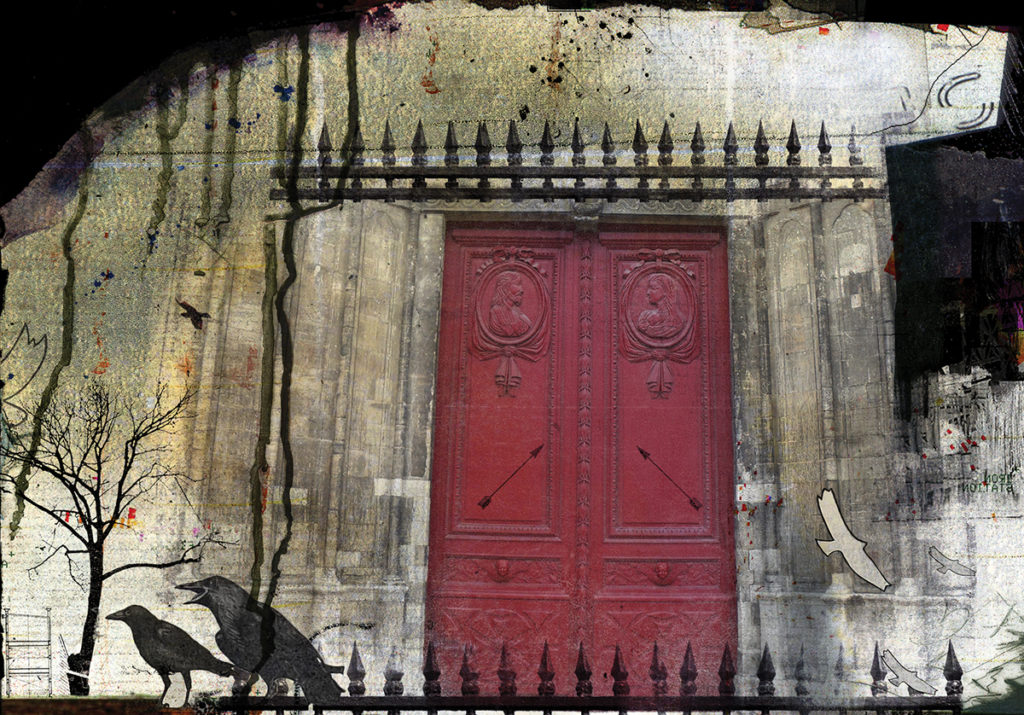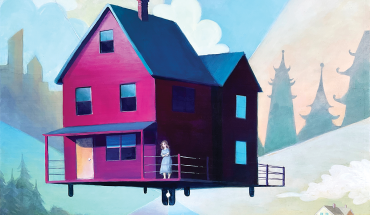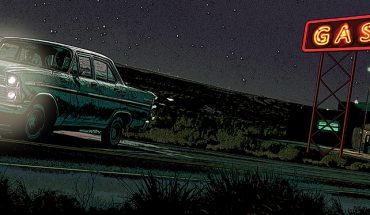During the time of cholera, a mourning father seeks solace in Raleigh’s City Cemetery in this piece of short fiction.
by Mamie Potter | illustration by Brian Hubble
Though it is still mostly dark, morning dew has settled on the grass of the City Cemetery. From where the doctor sits, he can hear horses pulling a wagon down Hargett Street, laden with granite for the lunatic asylum.
The damp seeps through his trousers. He puts his hand out, traces the words on the newly carved headstone: “To the
Sacred Memory of our Beloved only Child, Amelia Jane. 1846 -1851.”
Months earlier, they had celebrated the child’s fifth birthday — a joyous affair, with pony rides for her and her friends. In the blue taffeta dress her mother had sewed for her as a surprise, Amelia had delivered slices of cake, her face alight. That night, drowsy in her bed, she wrapped her arms around him. “I love you, Papa.”
What would he give to hear those words again?
Weariness holds him fast to the ground. Today was another of the countless days of treating those suffering from the cholera that descended upon Raleigh, decimating its population. No deaths today, but four patients hover between this world and the next. He has worked miracles — the gratitude of those whom he has saved is eternal — but the miracles are all too rare.
Until he lost Amelia, he thought he knew death. He’d stood at the cribs of dying babies, hot and red as embers; tried to comfort mothers too shocked to cry. He’d witnessed the last sour breaths of the elderly, surrounded by loved ones — this relative hoping for a quick end, the other counting his regrets.
How is it, he would like to ask Death, that most capricious creature, that you take my daughter, a full life ahead, and leave the Widow Stockman on her arthritic knees, praying to reunite with her husband?
A wind gusts. The doctor pulls his coat and scarf tightly around him. Lulled by the shushing of dead leaves, he puts his head on his knees, closes his eyes. Just a short rest, he thinks, before making his way down Bloodworth to his wife.
His wife. They cannot even comfort one another.
He catches a movement from the direction of the gate, footfall through the leaves. A woman. What is she doing alone in the cemetery at this hour? He stands on aching legs.
As she gets closer, he sees that she wears a long cloak, dark as raven feathers. Hair the color of maple sap surrounds a face luminous in the moonlight. As she moves closer, he rushes toward her, arms outstretched. He wants to kiss her, hard.
He stops a few feet from her, shakes his head. Fatigue and cold addle his brain.
Then she speaks: “Doctor,” her voice, deep and malevolent. He stumbles back, all desire replaced by revulsion.
“Come,” she says, gesturing with an elegant finger.
The doctor is unsure what to do, but she’s moving away. He hurries down the uneven cobblestone path, stumbles over every little rise.
They come to a mausoleum with a red iron door adorned with an arrow. Metal spikes surround the entrance, designed to keep out graverobbers, he supposes. The woman points at the doors, and they fly open. She steps inside, beckons him to follow.
Shivering, the doctor steps over the spikes and the two of them descend a set of rutted steps. When his eyes adjust, the doctor sees stone tables and alcoves carved into the earthen walls. Everywhere, white candles of all heights glow. Wax drips down the sides, puddling at the bases.
The woman slashes her arm through the dank air. “Welcome,” she says, her voice dusty and ancient.
In the flickering light from the candles, the woman is once again captivating. She turns and floats down the rows of candles; flames tremble in her wake. She stops and picks up a silver snuffer. It glints as she reaches over and puts out a flame, mumbles something indecipherable.
She walks to him and puts her face close to his: “Each of the burning candles in this room represents a living person.” The doctor jerks away from her noxious breath, a smell he knows all too well from putrid corpses.
So, then, this must be Death.
He looks around the room, takes in the unending rows of candles. Somewhere in this room his candle burns, long or short, and his daughter’s candle sits cold.
He feels feverish with anger, but “Why?” is all he can manage to say. Tears mingle with the sweat on his face.
She moves deeper into the room and stops, swivels around to face him.
“You want to see your daughter?” She tips her head back, her mouth wide with mirth, a piercing laugh erupting from it.
He flinches, her mockery like ice on his pain. He wants to smash her face, put his fingers around her neck and squeeze the contempt out of her.
He stands stock-still, composes himself, considers the import of her question.
How he yearns to see his daughter.
Yet images race through his head: his wife at the kitchen table, wiping her never-ending tears. The family of Mr. Albritton, depending on the doctor to ease his passage to the other side, the Cannons with their two sons on the verge of recovery. All who come to him for comfort or cure during this damnable outbreak. Even his own parents, who will be bereft if they lose him after the death of their beloved granddaughter.
No, he is not ready.
The sound of keening begins somewhere deep in the room. It is the sound of the agony, sorrow, even relief of those who have transitioned from this godforsaken tomb. The temperature in the room is stifling now.
He swipes at the perspiration on his forehead with his sleeve, turns back toward Death. Her stare penetrates something primordial inside him. She walks to a candle that still has significant height to it. The flame from the wick flares up.
Death smiles.
“It was never mine to decide, was it?” the doctor says to her, the keening is so loud now that his voice cannot penetrate.
Death lowers the snuffer on his candle. In that moment, the doctor looks deep into the room and sees his daughter’s beautiful face, radiant as the day of her birthday, and through the cries of a million saints, he hears her call his name.
This article originally appeared in the October 2022 issue of WALTER magazine.





